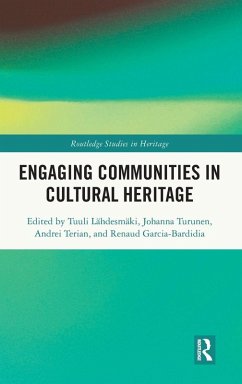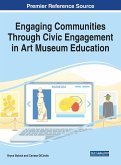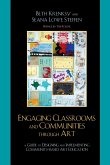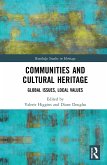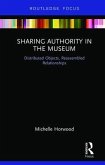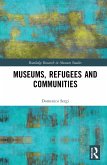Engaging Communities in Cultural Heritage
Herausgeber: Lähdesmäki, Tuuli; Terian, Andrei; Turunen, Johanna
Engaging Communities in Cultural Heritage
Herausgeber: Lähdesmäki, Tuuli; Terian, Andrei; Turunen, Johanna
- Gebundenes Buch
- Merkliste
- Auf die Merkliste
- Bewerten Bewerten
- Teilen
- Produkt teilen
- Produkterinnerung
- Produkterinnerung
This book explores the concepts and practices of participation and community engagement in cultural heritage, examining the impact of the participatory turn in the heritage sector and the key opportunities and challenges it presents.
Andere Kunden interessierten sich auch für
![Engaging Communities Through Civic Engagement in Art Museum Education Engaging Communities Through Civic Engagement in Art Museum Education]() Engaging Communities Through Civic Engagement in Art Museum Education193,99 €
Engaging Communities Through Civic Engagement in Art Museum Education193,99 €![Engaging Classrooms and Communities through Art Engaging Classrooms and Communities through Art]() Beth KrenskyEngaging Classrooms and Communities through Art54,99 €
Beth KrenskyEngaging Classrooms and Communities through Art54,99 €![Communities and Cultural Heritage Communities and Cultural Heritage]() Communities and Cultural Heritage168,99 €
Communities and Cultural Heritage168,99 €![Sharing Authority in the Museum Sharing Authority in the Museum]() Michelle HorwoodSharing Authority in the Museum69,99 €
Michelle HorwoodSharing Authority in the Museum69,99 €![Museums, Refugees and Communities Museums, Refugees and Communities]() Domenico SergiMuseums, Refugees and Communities167,99 €
Domenico SergiMuseums, Refugees and Communities167,99 €![Leadership of Inclusive and Sustainable Cultural Organisations Leadership of Inclusive and Sustainable Cultural Organisations]() Piotr BienkowskiLeadership of Inclusive and Sustainable Cultural Organisations169,99 €
Piotr BienkowskiLeadership of Inclusive and Sustainable Cultural Organisations169,99 €![Cultural Heritage Management in Africa Cultural Heritage Management in Africa]() Cultural Heritage Management in Africa149,99 €
Cultural Heritage Management in Africa149,99 €-
-
-
This book explores the concepts and practices of participation and community engagement in cultural heritage, examining the impact of the participatory turn in the heritage sector and the key opportunities and challenges it presents.
Produktdetails
- Produktdetails
- Verlag: Routledge
- Seitenzahl: 286
- Erscheinungstermin: 30. September 2025
- Englisch
- Abmessung: 240mm x 161mm x 20mm
- Gewicht: 596g
- ISBN-13: 9781032942469
- ISBN-10: 1032942460
- Artikelnr.: 74065001
- Herstellerkennzeichnung
- Libri GmbH
- Europaallee 1
- 36244 Bad Hersfeld
- gpsr@libri.de
- Verlag: Routledge
- Seitenzahl: 286
- Erscheinungstermin: 30. September 2025
- Englisch
- Abmessung: 240mm x 161mm x 20mm
- Gewicht: 596g
- ISBN-13: 9781032942469
- ISBN-10: 1032942460
- Artikelnr.: 74065001
- Herstellerkennzeichnung
- Libri GmbH
- Europaallee 1
- 36244 Bad Hersfeld
- gpsr@libri.de
Tuuli Lähdesmäki is a professor of art history at the University of Jyväskylä, Finland. She specialises in critical heritage studies, heritage policies and politics, cultural memory, identities, and narratives of Europe. Johanna Turunen is a senior researcher of contemporary culture studies at the University of Jyväskylä, Finland. Her work is focused on the intersections of critical heritage studies and post- and decolonial theory. Andrei Terian is a professor of Romanian literature at the Lucian Blaga University of Sibiu, Romania. He researches intangible cultural heritage, specialising in the textual heritage, cultural memory, canonisation, and digitisation. Renaud Garcia-Bardidia is a professor of cultural studies at the University of Lorraine and an associate researcher at the University of Burgundy, France. His research addresses the digitalisation of cultural consumption practices and the evolution of cultural institutions in this context.
Section I: Heritage participation and social inclusion; 1. Looking beyond
recited truths of heritage participation Inclusive perspectives on
institutions, epistemologies, and representation; 2. Examining public
perceptions of Roma representation in cultural festivals in Sibiu. 3. Local
cultural festivals as spaces of inclusion - The festival organisers'
perspective. 4. Branding Germanness in Transylvania. Combined and uneven
heritagisation; 5. Sauna Dialogues - The methodological potential of sauna
as a site for making heritage futures; 6. History and heritage in Sagunt,
Spain: An opportunity for social innovation through university culture;
Section II: Digital tools in heritage participation; 7. Digitizing literary
heritage: Some lessons from the Digital Museum of the Romanian Novel; 8.
Technological and cultural challenges in the collaborative design of
participatory heritage platforms between the Global North and Global South:
Toward decolonial computing.9. Playing with history: Engagement and
mediations through Assassin's Creed - An ethnographic perspective; 10.
Digital media and safeguarding intangible cultural heritage of minority
groups in China: A case study of animated short films Orochen Tale of Nisan
Shaman and Orochen Creation Story; Section III: Managing heritage
participation; 11. Opportunities and challenges of participatory heritage
governance: Developing the Seminaarinmäki Campus as a European Heritage
Label site in Finland; 12. Engaging communities of practice in cultural
heritage. A multi-site study of private partners within French cultural
ecosystems; 13. Reframing knowledge in cultural heritage: Promoting
openness and public engagement in museums through organic management; 14.
Civic engagement in cultural heritage. The Transylvanian Saxon case over
the last century; 15. Revisiting the darkness: Participatory approaches for
engaging with difficult and 'dark' heritage places;
recited truths of heritage participation Inclusive perspectives on
institutions, epistemologies, and representation; 2. Examining public
perceptions of Roma representation in cultural festivals in Sibiu. 3. Local
cultural festivals as spaces of inclusion - The festival organisers'
perspective. 4. Branding Germanness in Transylvania. Combined and uneven
heritagisation; 5. Sauna Dialogues - The methodological potential of sauna
as a site for making heritage futures; 6. History and heritage in Sagunt,
Spain: An opportunity for social innovation through university culture;
Section II: Digital tools in heritage participation; 7. Digitizing literary
heritage: Some lessons from the Digital Museum of the Romanian Novel; 8.
Technological and cultural challenges in the collaborative design of
participatory heritage platforms between the Global North and Global South:
Toward decolonial computing.9. Playing with history: Engagement and
mediations through Assassin's Creed - An ethnographic perspective; 10.
Digital media and safeguarding intangible cultural heritage of minority
groups in China: A case study of animated short films Orochen Tale of Nisan
Shaman and Orochen Creation Story; Section III: Managing heritage
participation; 11. Opportunities and challenges of participatory heritage
governance: Developing the Seminaarinmäki Campus as a European Heritage
Label site in Finland; 12. Engaging communities of practice in cultural
heritage. A multi-site study of private partners within French cultural
ecosystems; 13. Reframing knowledge in cultural heritage: Promoting
openness and public engagement in museums through organic management; 14.
Civic engagement in cultural heritage. The Transylvanian Saxon case over
the last century; 15. Revisiting the darkness: Participatory approaches for
engaging with difficult and 'dark' heritage places;
Section I: Heritage participation and social inclusion; 1. Looking beyond
recited truths of heritage participation Inclusive perspectives on
institutions, epistemologies, and representation; 2. Examining public
perceptions of Roma representation in cultural festivals in Sibiu. 3. Local
cultural festivals as spaces of inclusion - The festival organisers'
perspective. 4. Branding Germanness in Transylvania. Combined and uneven
heritagisation; 5. Sauna Dialogues - The methodological potential of sauna
as a site for making heritage futures; 6. History and heritage in Sagunt,
Spain: An opportunity for social innovation through university culture;
Section II: Digital tools in heritage participation; 7. Digitizing literary
heritage: Some lessons from the Digital Museum of the Romanian Novel; 8.
Technological and cultural challenges in the collaborative design of
participatory heritage platforms between the Global North and Global South:
Toward decolonial computing.9. Playing with history: Engagement and
mediations through Assassin's Creed - An ethnographic perspective; 10.
Digital media and safeguarding intangible cultural heritage of minority
groups in China: A case study of animated short films Orochen Tale of Nisan
Shaman and Orochen Creation Story; Section III: Managing heritage
participation; 11. Opportunities and challenges of participatory heritage
governance: Developing the Seminaarinmäki Campus as a European Heritage
Label site in Finland; 12. Engaging communities of practice in cultural
heritage. A multi-site study of private partners within French cultural
ecosystems; 13. Reframing knowledge in cultural heritage: Promoting
openness and public engagement in museums through organic management; 14.
Civic engagement in cultural heritage. The Transylvanian Saxon case over
the last century; 15. Revisiting the darkness: Participatory approaches for
engaging with difficult and 'dark' heritage places;
recited truths of heritage participation Inclusive perspectives on
institutions, epistemologies, and representation; 2. Examining public
perceptions of Roma representation in cultural festivals in Sibiu. 3. Local
cultural festivals as spaces of inclusion - The festival organisers'
perspective. 4. Branding Germanness in Transylvania. Combined and uneven
heritagisation; 5. Sauna Dialogues - The methodological potential of sauna
as a site for making heritage futures; 6. History and heritage in Sagunt,
Spain: An opportunity for social innovation through university culture;
Section II: Digital tools in heritage participation; 7. Digitizing literary
heritage: Some lessons from the Digital Museum of the Romanian Novel; 8.
Technological and cultural challenges in the collaborative design of
participatory heritage platforms between the Global North and Global South:
Toward decolonial computing.9. Playing with history: Engagement and
mediations through Assassin's Creed - An ethnographic perspective; 10.
Digital media and safeguarding intangible cultural heritage of minority
groups in China: A case study of animated short films Orochen Tale of Nisan
Shaman and Orochen Creation Story; Section III: Managing heritage
participation; 11. Opportunities and challenges of participatory heritage
governance: Developing the Seminaarinmäki Campus as a European Heritage
Label site in Finland; 12. Engaging communities of practice in cultural
heritage. A multi-site study of private partners within French cultural
ecosystems; 13. Reframing knowledge in cultural heritage: Promoting
openness and public engagement in museums through organic management; 14.
Civic engagement in cultural heritage. The Transylvanian Saxon case over
the last century; 15. Revisiting the darkness: Participatory approaches for
engaging with difficult and 'dark' heritage places;

